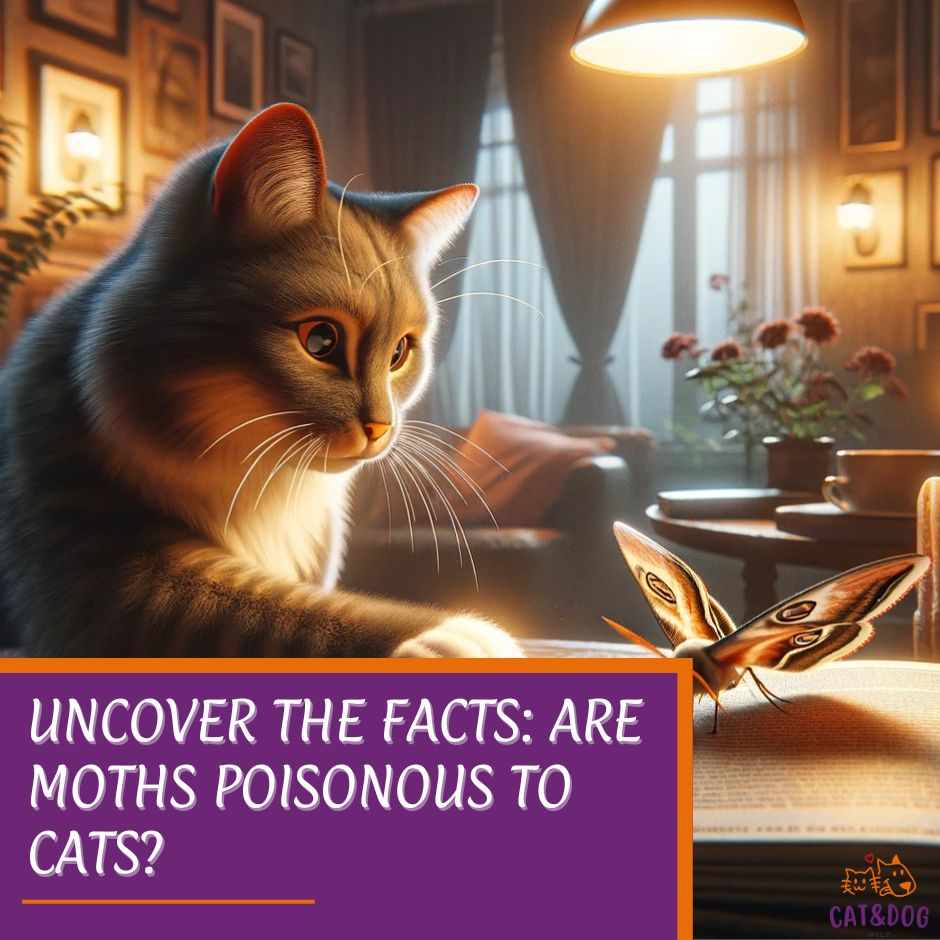Are moths poisonous to cats?
Cats are natural predators, hardwired to chase anything that moves, from toy mice to the fluttering insects in your backyard. Have you ever noticed your furry friend leaping into the air to catch a kitten?
It’s quite the spectacle – the ultimate game of cat and bug! But before you let your kitty revel in their little hunting game, you might want to know if moths, or any other insects, are safe for them to eat.
Cats are natural hunters, and while most spiders and insects are harmless to them, it’s important to be aware of potential risks.
Most moths are harmless to cats, and the occasional moth snack shouldn’t be a cause for concern.
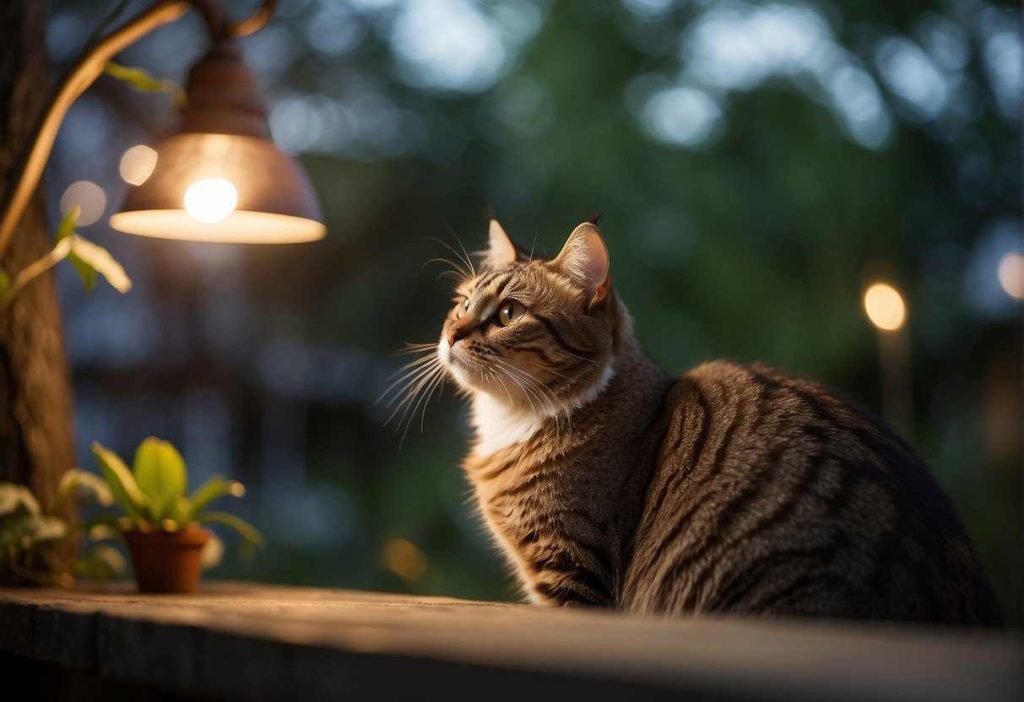
However, certain types of moths can be poisonous to cats, such as the oak processionary moth (OPM) caterpillar. (1)
If your cat comes into contact with an OPM caterpillar, they may experience discomfort and other symptoms such as skin irritation, difficulty breathing, and vomiting. (2)
If you notice your cat in discomfort after coming into contact with an OPM caterpillar, it is important to seek advice from your vet. The good news is, there’s no need to panic if your cat swallows a moth now and then.
Key Takeaways
- Most moths are safe and non-toxic for cats to eat.
- Overindulgence in moths can cause gastrointestinal upset in felines.
- Moths are common prey for cats due to their natural hunting instincts.
Are Moths Poisonous to Cats?
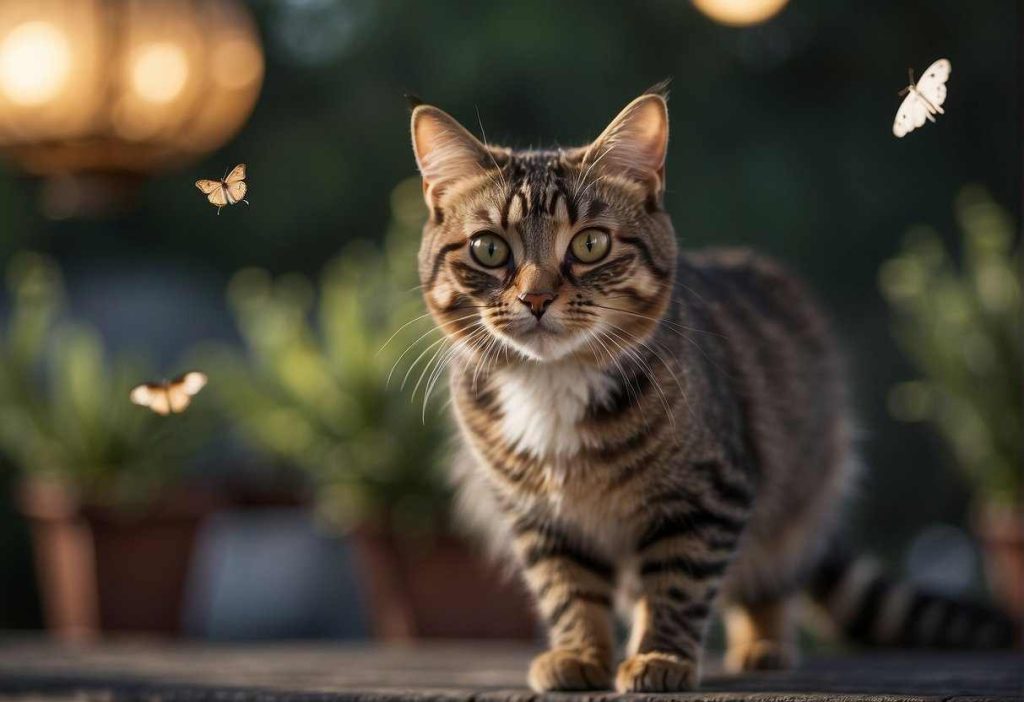
General Safety of Moths for Cats Most moths are harmless to cats, as they are safe to eat in small amounts. They’re like the unscheduled snack that accidentally flies into your kitty’s playground.
However, it’s important to keep an eye on the moth buffet—just in case.
Some moths, especially in certain stages of their life cycle, can carry toxins, specifically a toxic powder on their wings, that might upset your cat’s tummy if devoured in significant amounts.
While they may be a nuisance to us, we should also consider if they pose a danger to our feline friends.
Identifying Safe and Hazardous Moths:
Safe Moths:
- Common House Moth: Can buzz around without much worry.
- Garden Moths: Usually okay, but research specific types.
Hazardous Moths:
- Tiger Moths: Contain toxins that can be harmful in large doses. (3)
- Exotic Species: Unfamiliar moths might carry unknown risks—best to steer clear!
Information on Exotic Species: You won’t often stumble upon exotic moths in your kitchen, but if you’re a globetrotter bringing back souvenirs, remember your cat’s safety.
Some foreign moths, just like plants or foods, could be problematic for your pet.
Remember, while chasing moths gives your cat exercise and entertainment, make sure these winged creatures are safe for munching. If in doubt, keep the moths out!
Expert Opinions and Veterinary Advice
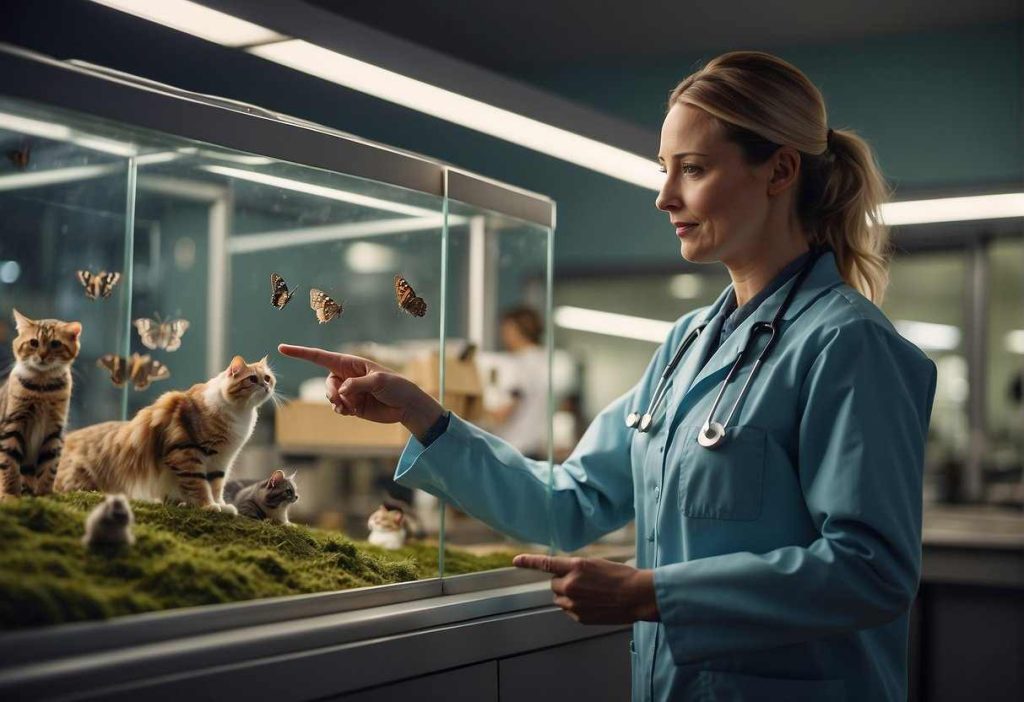
Veterinarians generally agree that most moths are harmless to cats. However, there are some exceptions.
These insects, including moths, are often part of your feline friend’s ‘snack list’ during their adventurous escapades, such as black ants, beetles, wasps, and insect bites. (4)
Experts point out a colorful little troublemaker: the Garden Tiger Moth. Its bright colors are nature’s way of saying, “I’m not so tasty,” or more seriously, “I might be toxic.”
Additionally, some types of ants, such as fire ants, can be harmful to cats with their venomous bites.
It is important to keep an eye on your cat’s interactions with insects, including black ants, beetles, and insect bites, to ensure their safety.
How about immediate reactions? If your cat eats a moth, they might experience mild stomach upset. Vets advise to:
- Watch for vomiting or diarrhea (5)
- Check for any signs of distress
In most cases, your cat will be just fine. But, keep an eye out for allergic reactions which could present as swelling or excessive scratching.
For the long haul, there aren’t many known lasting effects from eating moths, but it’s always better to be safe. You might want to play it safe and discourage your cat from turning these insects into treats.
Keep tabs on your cat’s behavior post-moth munching. Symptoms like prolonged vomiting, diarrhea, or lethargy are signals to contact your vet. (6)
And remember, don’t panic—most moth-eating incidents are just a walk in the park for your adventurous kitty.
Dealing with Moth Ingestion
First Aid and Home Care
If you catch your cat in the act of snacking on a moth, here’s how you can intervene:
- Stay Calm: Cats are pros at sensing your mood. If you’re calm, they’ll be too.
- Water: Offer your cat some water. It can help to wash down any parts of the moth that may be irritating.
- Monitor: Keep an eye on your cat for any odd behavior or symptoms of distress.
When to See a Veterinarian
Now, let’s talk about when it’s time to ring up your vet. Look out for these signs:
- Vomiting or Diarrhea: If it’s more than just a one-time incident, call the vet. (7)
- Lethargy: A sudden lack of energy can be a red flag.
- Appetite Changes: If your buddy isn’t hungry for their favorite meal, something might be up.
- Breathing Trouble: Any sort of difficulty with breathing is a sign to get professional help quickly.
Remember, it’s rare for a moth to fatally poison a cat. However, if a cat does ingest a moth, there are potential dangers to be aware of, including the risk of seizures and trouble breathing.
As a loving pet owner, it’s better to be on the safe side and contact your veterinarian if you suspect your cat has eaten a moth. This is especially important since some moths can carry parasites or toxins.
And let’s not forget that a quirky little fact from our friends at Nahf mentioned that the chance of poisoning is relatively low since cats won’t generally eat moths unless quite hungry.
In cases of moth ingestion, it is important to watch out for signs of mothball toxicity, such as lethargy, trouble breathing, seizures, tremors, and vomiting, and to seek immediate veterinary care if any toxic effects are observed.
So, keep a close watch on your whiskered companion after their unintended insect feast.
And while numbers and statistics on moth ingestion might be scarce, knowing the signs of trouble and acting promptly will ensure your cat remains healthy and purrfectly happy!
Practical Tips for Preventing Moth Ingestion
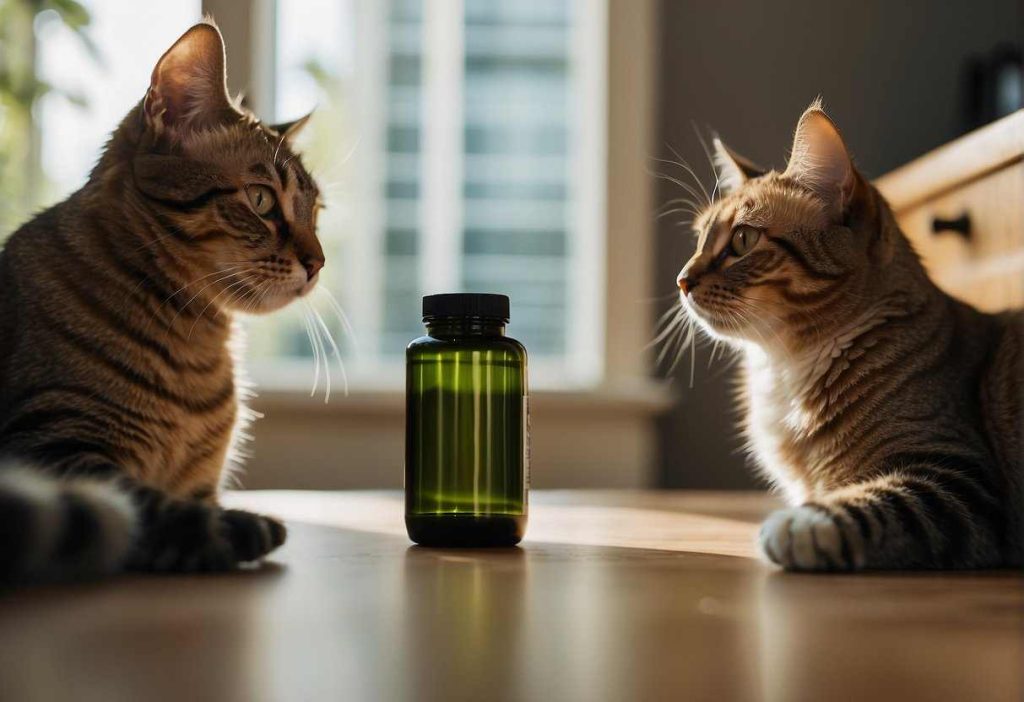
Here’s how you can keep those moths out of your cat’s mouth by providing them with a balanced diet of healthy wet cat food and ensuring your feline friend stays safe and happy.
Preventive Measures and Safety Tips:
- Keep your home clean: Regularly vacuum and dust your home, especially in corners and closets where moths like to hang out.
- Natural fibers check: Moths are attracted to natural fibers like wool. Store woolens in airtight containers or bags to reduce the attraction.
Caught in the Act? If your cat catches a moth, don’t panic. Gently remove it from your cat’s mouth if possible and give your kitty a little distraction—perhaps a favorite toy?
Alternatives to Mothballs and Safe Deterrents:
- Cedar: Use cedar blocks or chips in your closets; they’re a natural moth deterrent.
- Lavender: Sachets of lavender can discourage moths and are safe for cats.
- DIY sprays: A mix of water and essential oils like neem can repel moths without harming pets.
Household Pest Precautions:
- Keep an eye out for any other pests that might attract moths. Seal up food containers and don’t leave pet food out for too long.
Remember, while moths generally aren’t toxic, they can pose a risk of digestive upset or choking. Monitor your cat’s playtime, and let’s keep those moths out of their meal plan!
Now, who’s up for a bit of feather-on-a-string action to distract our feline hunters from those pesky-winged visitors?
Enhancing Knowledge of Moth Species and Their Effects
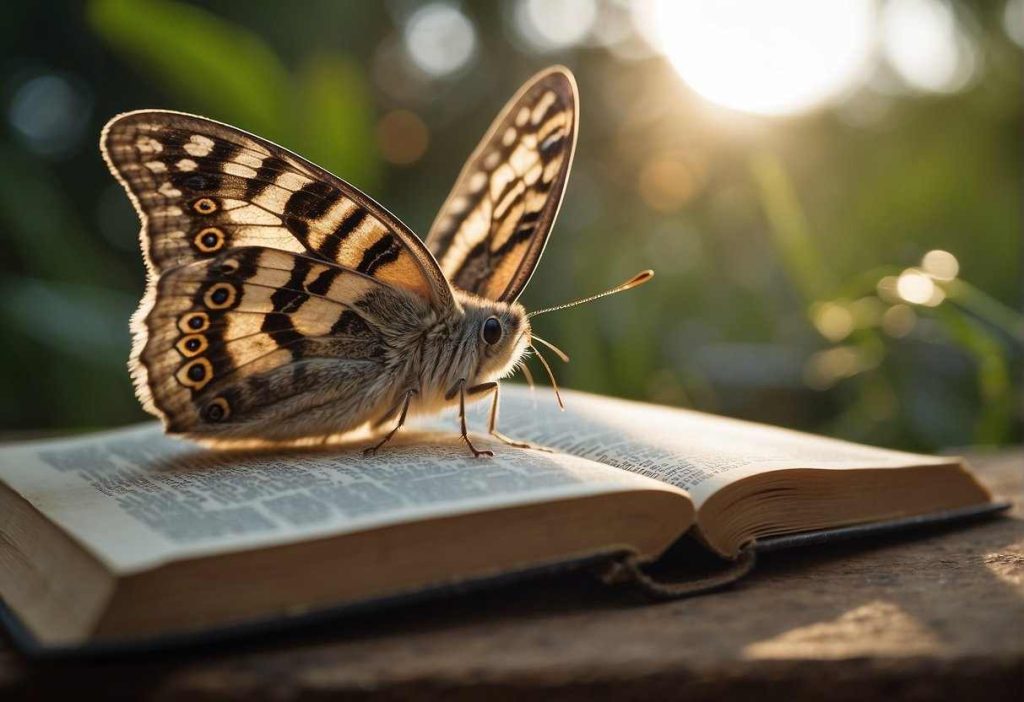
Detailed Guide to Moth Species Learning which moths are harmful is key. Most moths won’t bite or sting, but they can carry toxins. Here’s what you should look out for:
- Stinging moths: Beware of species with venomous spines. Contact can cause symptoms from a burning sensation to hives, but fortunately, they aren’t known to cause serious internal issues in humans or pets.
- Toxic caterpillars: Remember, moths start as caterpillars, some of which may be toxic if ingested.
- Moths and Cats: If your kitty does munch on a moth, chances of severe poisoning are low, but some species might upset their tummy.
Real-Life Examples and Case Studies Let me share a real-life tidbit. In September 2022, a case surfaced where a cat had a bout of indigestion after engaging in a midnight snack—a moth.
A quick vet visit and some rest later, the cat was back on its paws.
Here’s a snapshot table for quick reference:
| Factor | Detail |
| Biting and Stinging | Moths don’t bite. Watch out for stinging species. |
| Venom | No lethal venom but can cause irritation and allergies. |
| Effect on Cats | Rarely serious, but occasionally cause mild irritation. |
| Actions if Ingested | Monitor your cat, and consult a vet if symptoms arise. |
If you ever find your feline in such a situation, remember, keeping an eye on their response is key. Most cats will be fine with a little rest, but do check with your vet, just to be on the safe side.
So there you go, your tailored guide to moths and their possible effects on your furry companion—keep this info in your kitty-care toolkit!
Quick Recap
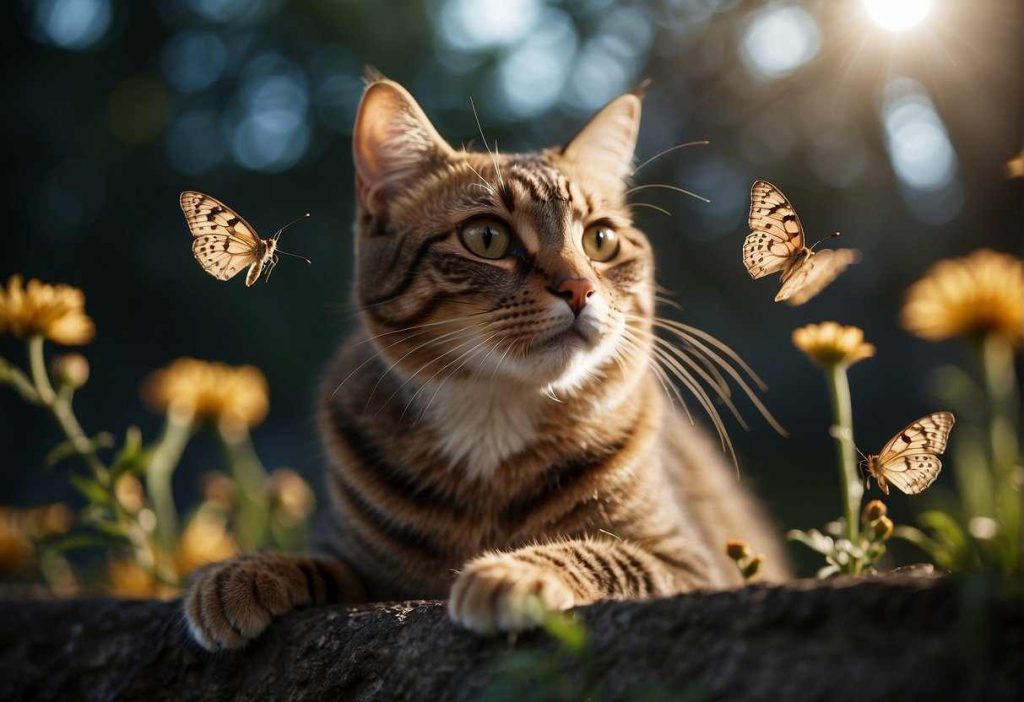
Let’s break down the moth mystery with some quick facts:
- Most moths: Harmless to your kitty. Chasing them is just part of their playful nature.
- Certain species: Be wary, some moths can be toxic if they’re gobbled up in large quantities.
Safety Check
- Non-toxic moths: Typically safe, but overindulgence might upset your cat’s tummy.
- Toxic moths: Rare, yet real. Can cause symptoms like vomiting or diarrhea.
Numbers Game: There aren’t specific numbers or statistics mentioned, but here’s the gist — toxicity is uncommon but possible.
Responsible Pet Ownership: Stay observant. If your cat seems off after a moth munching session, call the vet.
Remember, your pawed pal’s health is in your hands. Keeping an eye out for odd behavior post-moth chasing is part of being a stellar pet parent. So, stay informed and keep that vet’s number handy!
Frequently Asked Questions
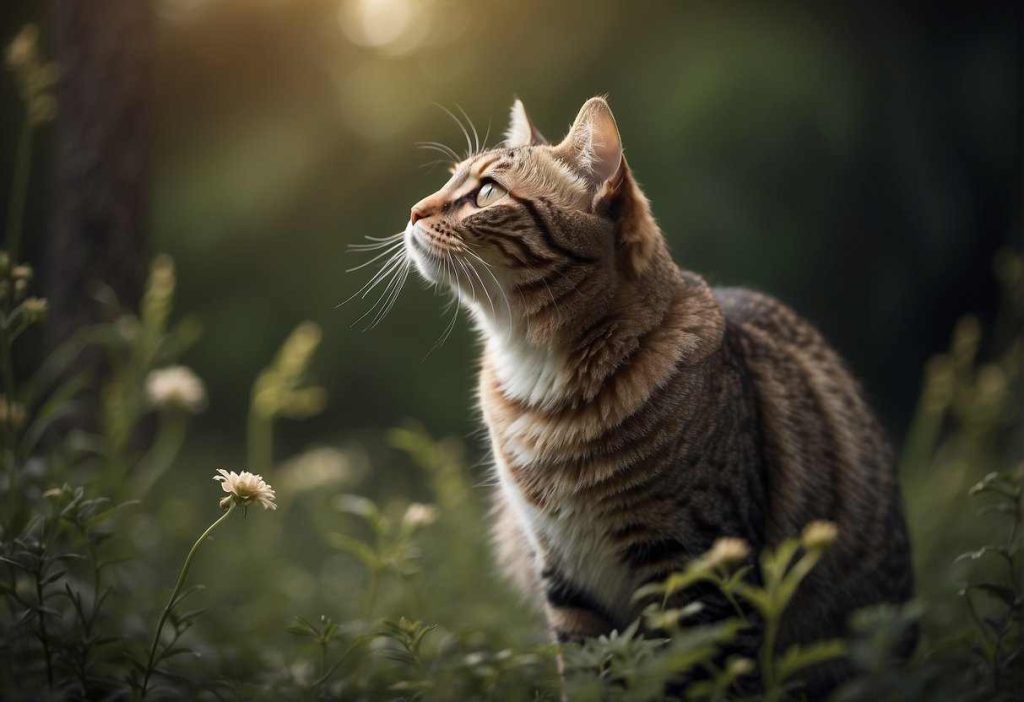
When it comes to our feline friends, we often wonder what sorts of things they can safely get into. You’ve probably seen your cat chasing moths, but what happens if they succeed in catching and eating one?
Let’s tackle some common concerns you might have.
Can moths harm my cat if ingested?
The majority of common moths are not harmful to cats if ingested in small quantities. However, some moths may carry parasites that could potentially cause health issues.
What symptoms should I watch for if my cat eats a moth?
Keep an eye out for vomiting, diarrhea, or lethargy after your cat eats a moth. These could be signs of a parasite or an allergic reaction.
Are there any specific types of moths that are poisonous to cats?
Certain moths may be toxic if they’ve been exposed to pesticides or insecticides.
It’s not typical for the moth itself to be poisonous but always keep in context where the moth came from.
What should I do immediately if my cat eats a moth?
If it’s a common moth, simply observe your cat for any adverse reactions.
If you suspect the moth may have been toxic or your cat starts showing symptoms, contact your vet.
Are certain moths, like Miller moths, safe for cats to eat?
Miller moths are generally not toxic to cats. However, eating large quantities of these moths could cause a tummy upset.
How can I prevent my cat from eating moths?
You could minimize moth hunting by keeping your cat indoors during peak moth activity or using insect screens on windows to keep moths out.
Should I take my cat to the vet after it eats a moth?
It isn’t usually necessary to take your cat to the vet for eating a common moth.
However, if your cat exhibits any unusual symptoms or if you know the moth could have been exposed to chemicals, then a vet visit is a good idea.
- Free Online Casino Games: What You Need to Know - July 26, 2025
- Ideal Casinos Mobile: The Ultimate Guide to Mobile Betting - July 26, 2025
- The Ultimate Overview to Casino Site Gamings Online - July 26, 2025

